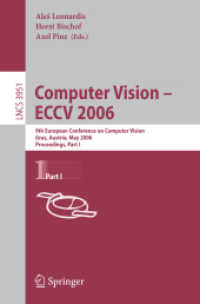- ホーム
- > 洋書
- > 英文書
- > History / World
Full Description
This open access edited collection sheds new light on how socialist parties envisioned, addressed and contributed to the transformation of the international and economic order from the 1970s to the 1990s.
Social democracy has been said to be in crisis for decades, with multiple scholars claiming that its end is at hand in these uncertain times. This book interrogates this view, pointing to claims that social democracy has been, and is, successfully adapting to the ever-evolving context in which it exists. Both arguments point to the period between the 1970s and the 1990s as the watershed decades in which the roots of social democracy's decline and/or transformation are to be found.
Exploring social democracy's place in the international order during the Cold War, this book studies the evolution of socialist parties including British Labour, German Social Democrats, Greece's PASOK and others, to understand their contribution to this transformation. Exploring whether social democratic ideology was put on the defensive because of the international economic crises of 1973 and 1979, it argues that the source of this ideological crisis was also political and intellectual, as neo-liberal thinkers challenged core social democratic values by attacking the weaknesses in the premises of Keynesian welfare states. As a result, a new kind of social democracy emerged, one that sought to cope with the new international post-Cold War order; globalization, slow economic growth, and the shrinking of the working class.
The ebook editions of this book are available open access under a CC BY-NC-ND 4.0 licence on bloomsburycollections.com. Open access was funded by Universidad Complutense de Madrid, Universidad de Castilla-La Mancha, Institut François Mitterrand and Fundación Felipe González.
Contents
1. Introduction: Alan Granadino (Complutense University of Madrid) and Sergio Molina (University of Castilla-La Mancha)
2. "Challenges and Opportunities for Southern Europe in the Second Cold War" Antonio Moreno (Complutense University of Madrid) and Carlos Sanz (Complutense University of Madrid)
3. "Democracy, anticommunism, NATO and Europe: The cardinal points of the German "solidarity" with the Spanish socialism (1975-1986)" Antonio Muñoz (Instituto de Ciências Sociais, Lisboa)
4. "Ideological Trends of a Socialism in Transition: The Spanish Socialist Workers' Party (PSOE), from Exile to European Integration" Juan Andrade (Complutense University of Madrid)
5. "Spain would be neutral, and Europe a factor of peace: The international policy envisioned by Spanish socialists in the 1970s and 1980s" Alan Granadino (Complutense University of Madrid)
6. "An unloved concept: The position of Portuguese socialists towards social-democracy: Between internal pressures and external influences" David Castaño (IPRI-Universidade Nova de Lisboa)
7. "The Political Ideology of the Panhellenic Socialist Movement Party (PASOK)" Lykourgos Kourkouvelas (University of Athens)
8. "The Italian Socialist Party after 1976: From the Periphery to the Periphery of European Socialism?" Michele di Donato (Università di Pisa)
9. "François Mitterrand, French Socialist Party and Latin America: Argentina (1971-1983)" Matthieu Trouvé (Sciences Po Bordeaux)
10. "François Mitterrand's vision of European security, between the Cold War and the fight against terrorism" Nicolás Badalassi (Sciences Po Aix)
11. "Resizing the Euro-Latin American Relations: The Historical Significance of the Socialist International " Luciana Fazio (LUISS Guido Carli)








